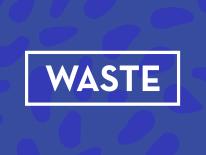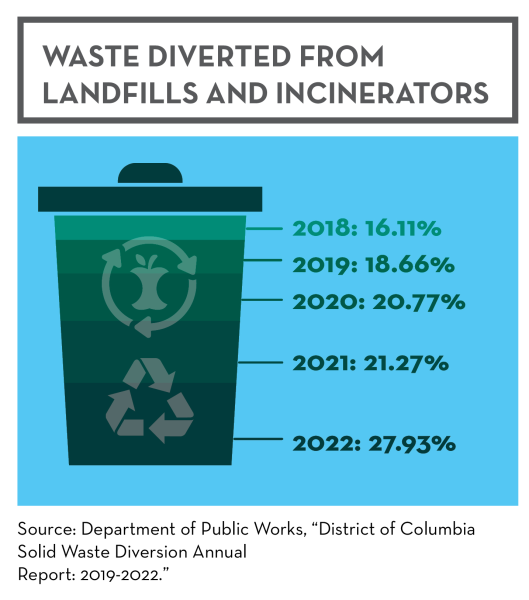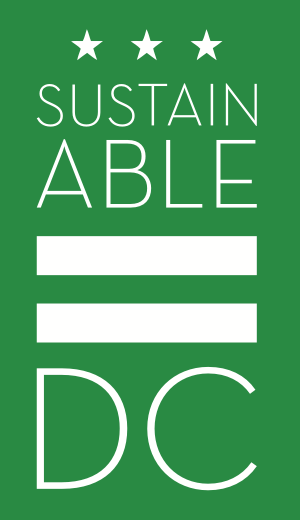

 The Sustainable DC Plan was the first to announce the District’s commitment to achieving 80% waste diversion from landfills and incineration. The District has made great progress in working toward the vision of a Zero Waste DC, through efforts such as food waste drop-offs throughout the District for composting, a household curbside composting pilot program, enhanced recycling education campaigns, food waste reduction grants for businesses, and the launch of a donation and reuse program. In order to reach the ambitious 80% waste diversion goal, it is crucial that the District improve efforts to reduce waste, encourage and support the reuse of materials, and improve diversion efforts such as recycling and composting. To do so, the District must navigate the unique challenges it faces when addressing waste, including land constraints, a lack of industrial-zoned land, a mix of public and private trash haulers, and being located at the intersection of three jurisdictions and two regional rivers. By taking local action and working collaboratively with the region, the District can achieve a zero waste future.
The Sustainable DC Plan was the first to announce the District’s commitment to achieving 80% waste diversion from landfills and incineration. The District has made great progress in working toward the vision of a Zero Waste DC, through efforts such as food waste drop-offs throughout the District for composting, a household curbside composting pilot program, enhanced recycling education campaigns, food waste reduction grants for businesses, and the launch of a donation and reuse program. In order to reach the ambitious 80% waste diversion goal, it is crucial that the District improve efforts to reduce waste, encourage and support the reuse of materials, and improve diversion efforts such as recycling and composting. To do so, the District must navigate the unique challenges it faces when addressing waste, including land constraints, a lack of industrial-zoned land, a mix of public and private trash haulers, and being located at the intersection of three jurisdictions and two regional rivers. By taking local action and working collaboratively with the region, the District can achieve a zero waste future.
Goal 1: Reduce waste generated per capita in the District
Status:  The average progress score of actions under this goal is “Moderate Progress” (2 out of 4). See annual progress reports for details.
The average progress score of actions under this goal is “Moderate Progress” (2 out of 4). See annual progress reports for details.
What's Been Done?
- Some difficult to recycle or compost materials are banned in the District, such as polystyrene containers and plastic straws.
- The Zero Waste Omnibus Amendment Act established requirements that District food-serving entities and third-party food ordering platforms must only provide disposable utensils and other small items if first requested by the customer.
- The Office of Contracting and Procurement developed sustainable specifications for more than 15 product categories with sample contract language that can be included in scopes of work.
What is Left to Do?
- Study the feasibility of an equitably priced collection billing structure (like Save-As-You-Throw).
- Expand current bans and fees on waste products like expanded polystyrene and disposable bags.
- Work with surrounding jurisdictions to develop and implement a regional approach to reducing plastic waste.
- Increase purchases of Environmentally Preferable Products and Services.
Goal 2: Facilitate local reuse and recovery of materials to capture their economic and social value
Status:  The average progress score of actions under this goal is between “Initiated” (1 out of 4) and “Moderate Progress” (2 out of 4). See annual progress reports for details.
The average progress score of actions under this goal is between “Initiated” (1 out of 4) and “Moderate Progress” (2 out of 4). See annual progress reports for details.
What's Been Done?
- Product stewardship programs exist for paint, electronics, and batteries, meaning producers of these products are required to develop systems to pay for and manage the end-of-life of their products.
- The 2017 DC Green Construction Code, adopted in 2020, requires that 50% or more construction waste is diverted for certain construction projects. It also rewards projects that increase diversion to 75% or more.
- Section 327 of the 2017 DC Residential Code (adopted in 2020) requires the reuse of a minimum of 5% of total nonhazardous building materials. This requirement applies to new construction and certain alterations of residential buildings fewer than 4 stories.
- The Reuse DC program encourages donation and reuse of materials in the District through repair and swap events, an online directory, educational materials, grants, and more.
What is Left to Do?
- Reuse or recycle 50% of all commercial construction waste.
- Reuse 5% of total non-hazardous residential building materials.
- Develop a greenhouse gas impact calculator for specific waste streams to support the development of a circular economy and guide further policy development.
- Support the development of a locally based, circular economy by facilitating the separation of waste into commodity streams.
Goal 3: Achieve zero waste citywide
Status:  The average progress score of actions under this goal is between “Moderate Progress” (2 out of 4) and “Significant Progress” (3 out of 4). See annual progress reports for details.
The average progress score of actions under this goal is between “Moderate Progress” (2 out of 4) and “Significant Progress” (3 out of 4). See annual progress reports for details.
What's Been Done?
- The Department of Parks and Recreation (DPR) manages a Community Compost Cooperative Network to allow trained community members to compost food scraps with garden waste from DPR and partner DPR gardens to responsibly create high quality compost.
- The Department of Public Works funds staffed food waste drop-off sites at designated farmers markets and community locations and collects food waste curbside from select residential customers for composting.
- The Department of Public Works funds manages 24/7 food waste drop-off bins all around the District to collect food waste from residential customers for composting.
- The Department of Public Works conducts education on recycling correctly, such as through the Feed on the Street Program that provides residents with “oops” tags and feedback if there are non-recyclable items in their recycle bins.
What is Left to Do?
- Provide District Government-served households with three, right-sized bins for collecting compostable materials, recyclable items, and trash.
- Establish a new organics processing facility (composting, anaerobic digestion, or co-digestion preprocessing) in the District to capture food and other organic waste.
- Increase the number of co-located (trash and recycling) receptacles that are publicly accessible.
- Aggressively enhance educational resources and outreach campaigns that educate residents, workers and visitors on waste minimization, recycling, and composting.
- Expand Washington, DC’s product stewardship program to include additional product streams.
- Bolster enforcement efforts to ensure that commercially-serviced businesses and multifamily buildings comply with the requirements to provide adequate and timely on-site recycling and trash collection.
Last updated: June 2025

